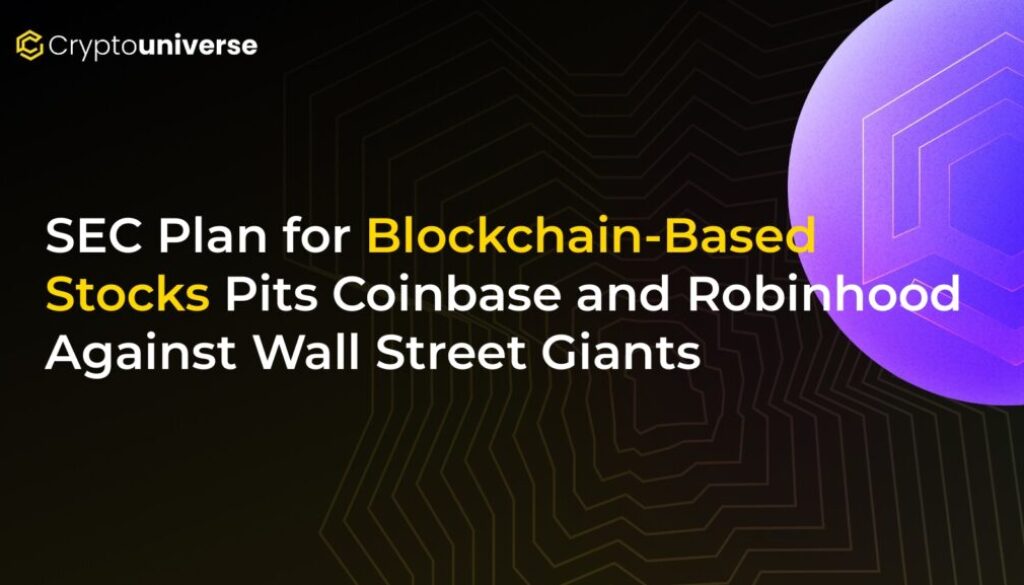SEC Plan for Blockchain-Based Stocks Pits Coinbase and Robinhood Against Wall Street Giants

A New Financial Frontier or a Market Meltdown Waiting to Happen?
Imagine buying a piece of Apple or Netflix directly from your crypto wallet, stored right alongside your Bitcoin and Ethereum. This isn’t a far-off futuristic dream; it could soon be a reality. The U.S. Securities and Exchange Commission (SEC) is reportedly fast-tracking a plan to allow stocks to be traded as tokens on a blockchain, a move that is setting the stage for a monumental clash between crypto-native innovators and the titans of traditional finance.
On one side, you have companies like Coinbase and Robinhood, eager to merge the worlds of crypto and traditional equities. On the other, Wall Street powerhouses like Citadel Securities are sounding the alarm, warning of market disruption and demanding a more cautious approach. This battle isn’t just about a new product; it’s about the very future of how we buy, sell, and own financial assets.
What Are Tokenized Stocks, Anyway?
Before diving into the controversy, let’s break down the core concept. A tokenized stock isn’t the same as the stock you’d buy through a traditional brokerage account. Here’s the difference:
- Traditional Stocks: When you buy a share of a company, your broker acquires it on your behalf, and you are assigned full ownership rights within a complex system of clearinghouses and custodians.
- Tokenized Stocks: This involves an extra step. A firm creates a digital token on a blockchain (like Ethereum) that represents a claim on the underlying, real-world share. This token is what you buy and hold in your crypto wallet. It’s a digital IOU backed by the actual stock.
While both give you economic exposure to the company’s performance, the underlying mechanics are fundamentally different. Proponents argue this new method is a massive upgrade.
The Case for On-Chain Stocks: Speed, Access, and Efficiency
Crypto advocates and firms like Coinbase argue that tokenizing stocks solves some of Wall Street’s oldest and most persistent problems.
Real-Time Settlement: The End of the Waiting Game
Currently, when you sell a stock, it takes at least one business day (a system known as T+1) for the trade to officially settle and the cash to land in your account. During periods of extreme volatility, this delay can create massive liquidity crunches for brokerages. This was famously highlighted during the 2021 meme stock frenzy, where Robinhood faced a crisis due to a backlog in trade settlements.
Blockchain technology enables near-instantaneous, or real-time, settlement (T+0). Trades are finalized in minutes, not days, drastically reducing counterparty risk and freeing up capital that would otherwise be tied up in transit.
Democratizing Global Access
Tokenized stocks are already proving their worth in international markets. Crypto exchanges like Kraken have found them to be incredibly popular in countries like South Africa, where investors face high fees and barriers to accessing U.S. equities. Blockchain technology effectively flattens the financial world, allowing anyone with an internet connection to invest in global companies without exorbitant intermediary costs.
Wall Street’s Pushback: The Risks of Moving Too Fast
While the benefits sound compelling, established financial players are urging caution. Citadel Securities, which processes over a third of all U.S. retail stock trades, has raised significant concerns about the SEC’s plan to grant “exemptive relief”—a regulatory shortcut that would bypass many existing rules to get on-chain trading up and running quickly.
Fears of Market Disruption
Incumbents warn that introducing a parallel, blockchain-based trading system without a comprehensive regulatory framework could fragment the market. This could lead to price discrepancies, reduced liquidity, and an uneven playing field that ultimately harms investors.
Compliance and Security Questions
A major hurdle is ensuring that tokenized stocks adhere to the same strict compliance standards as the traditional system. How do you enforce robust Anti-Money Laundering (AML) and Know Your Customer (KYC) checks in a decentralized environment? Without the traditional guardrails, critics fear these new systems could be exploited for illicit activities.
What’s Next? A Legal Showdown is Likely
Don’t expect to be buying tokenized Tesla shares in your Coinbase wallet next week. The road ahead is fraught with challenges. According to reports, legacy financial firms are likely to challenge the SEC in court if it proceeds with a simple exemption. They will push for a full, formal rulemaking process, which is far more detailed and can take years to complete.
The stage is set for a defining conflict over the future of finance. The SEC plan for


